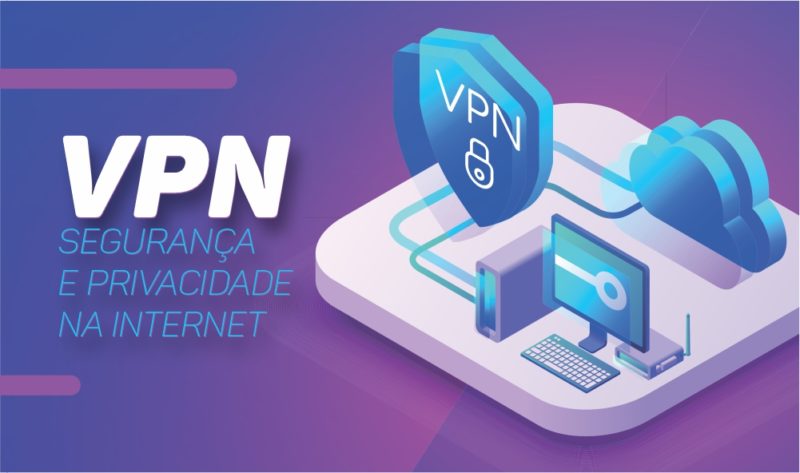It is very likely that you may have heard or even used a private virtual network (VPN) to make internet access safer. But and in your company, has it been considered to use this technology as a tool for improving employee safety and mobility?
In this article, we will explain what VPN is, how this technology works, some examples of use and what are the advantages and benefits for the corporate environment of companies.
What is VPN?
VPN acronym means virtual private network , translating private virtual network. It is a network technology that uses the internet to connect a group of computer and maintain the security of the data that travel between them.
In a common scenario, when you connect to the internet and browse websites, download materials and send documents by email, your device is identified through the IP number, and much of your data (excluding the most sensitive) they travel openly and can be intercepted by providers or malicious software. With a private network, data is encrypted, the user is protected and cannot be easily identified.
This technology is used by people who mainly want to ensure browsing privacy and access restricted content in the country. But companies around the world are discovering how to take advantage of VPNs to increase the security of their data and remote work.
How does a VPN work?
Similar to a firewall that protects information on your computer, VPN protects your data on the internet. VPNs can be used for both remote access by connecting computer to a network and site to the site, connecting two networks.
Browsing the internet without a VPN, you connect to your ISP (Internet Service Provider) server, which in turn connects you to your choice. This means that all your Internet traffic activity goes through the provider and this may or may apply the monitoring of your actions. However, when you sail through a VPN, your traffic uses an encrypted "tunnel". This means that it is not accessible to anyone but you and the VPN server.
Examples of VPN uses
By itself, a VPN only helps to increase data security and access features on a network that you are not physically connected. However, let's list here some examples of use of how a user normally uses:
- Employee/Employee: Uses VPN provided by the company when it is at home or traveling to access resources in the local network;
- Downloads: To prevent a company from putting it on the black list because it is downloading torrents, this user uses VPN to stay safe while using peer to peer networks;
- To maintain privacy: This type of user always thinks they are reading what he sends or receives. Therefore, to have safe and encrypted communication, far from curious eyes, this profile uses VPN connection;
- Traveler: Services such as Netflix and Amazon Prime provide different content for each country, according to their language and customs. Therefore, this traveling user has a VPN connection with the country of origin to access its favorite content.
If you do not identify with any of these examples above, remember that it is not the type of profile of the user that makes the use of VPN being useful, but your needs. As an example, we can mention your participation in an event or workshop, where everyone uses the same public network to connect to the internet. This is a situation that we consider to have a great risk of traffic interception. Have you ever imagined someone intercepting the passwords of your professional email?
Advantages and benefits of VPN for companies
Using VPN in a corporate environment is proving to be a good opportunity for IT managers who care about security, productivity and cost reduction.
Information security
The main advantage for a company that uses VPN is certainly the increase in information security when there is a need to transfer confidential data between branches or for employees who work remotely and need to access data on the local network.
Cost reduction
The investment to provide a VPN connection in your company is very low if you consider the costs of damage and losses that a leak of confidential data can cause. Just to give you an idea, in 2019 Brazil lost more than R$80 billion to cyber attacks.
Increased productivity
The peace of mind to work without worrying about so many security issues means that employees are only focused on what matters and consequently their productivity increases. For this reason, VPN can be a great ally in corporate environments.
Mobility
With a VPN, a company can provide secure access to internal network resources, such as documents or software, to any employee or customer from anywhere in the world. With this mobility benefit we were able to demonstrate previous advantages such as safety, reduced travel costs and increased productivity.
To finish
I hope that with this article you may have understood the operation of VPN and how it can be useful for your business. There is also a lot of information that can complement your study on this subject. However, it is evident that this technology becomes increasingly necessary on today's days where we come across security and productivity problems.
The point now is that there are many VPN solutions for companies, each with its own characteristics and prices. Do you want to know which one is ideal for yours? It is on this subject that I will write in the next article.
Follow the blog articles by signing our Newsletter “ Information Security Week ” where we send weekly to your email links selected with news, events, books, videos, and information security materials.
Any questions make a comment below or send an email to alex@lumiun.com













10 Comments
Comments closed